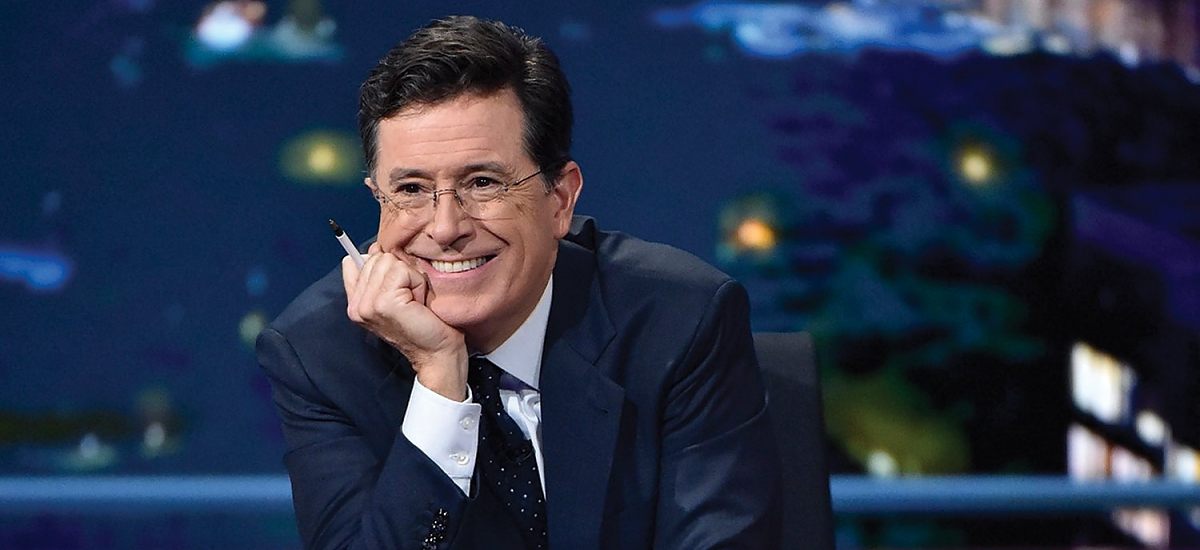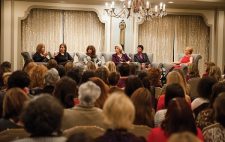While rising to comedic fame, Stephen Colbert has stopped along the way to support the arts in his New Jersey hometown. The Montclair Film Festival has become an annual sold-out success because the well-known funnyman lends his name, time and clout to the event. Colbert is a man of several personas, so you never quite know who might turn up on his show or at an appearance. But if he’s about to support New Jersey and the arts, one thing you can be certain of: Colbert does show up – big time.
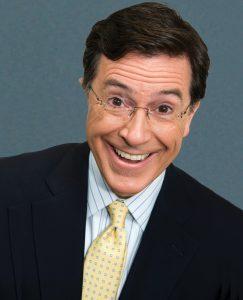
Colbert brings many characters to his comedy acts
There is something about Stephen Colbert that is simply electric. When he steps onstage, the excitement in the room is nearlypalpable. The New Jersey resident knows exactly how to use his natural magnetism and wit to command an audience; he’s had plenty of practice.
The funnyman spent 17 years on Comedy Central, first on “The Daily Show with Jon Stewart” and later as the host of his own spin-off, “The Colbert Report.” In September, Colbert succeeded David Letterman as host of “The Late Show” on CBS.
In the meantime, he’s become a household name. The 51-year-old has a namesake Ben & Jerry’s ice cream flavor (Colbert’s Americone Dream), and a few years ago NASA named an exercise device, the COLBERT (Combined Operational Load Bearing External Resistance Elliptical Trainer), in his honor.
This path to pop culture greatness began during his childhood in South Carolina – an upbringing evidenced by his often-unnoticeable accent and the occasional “y’all.” He got his first taste of the performing arts there, during a now-famous music and dance festival.
“There was a festival that started when I was 13 years old,” Colbert recalls. “The festival started in Italy and came to my hometown. It was the Festival dei Due Mondi (Festival of Two Worlds), which began in Spoleto, Italy. It became the Spoleto Festival in Charleston. That’s how I first got involved in the arts. That’s how I first started performing. That was my first dream to be able to create something. That festival is how I first learned to create.”
Years later, after Colbert moved with his family to Montclair, N.J., he was able to pay homage to that first festival by supporting his wife, Evie McGee, as she co-founded the Montclair Film Festival. Now in its fifth year, the festival has grown by leaps and bounds, with McGee as vice chair of the board. That rapid growth is due in part to Colbert’s annual commitment – hosting a fundraiser at the N.J. Performing Arts Center (NJPAC) in Newark. In past years, he’s done onstage interviews with stars like Jimmy Fallon and Steve Carell, with proceeds from ticket sales benefitting the festival.
“I’m so excited to do this every year, to be here for this benefit. I get to talk to the most amazing people,” Colbert said at this year’s fundraiser in November. “I’m so proud of the festival, and so excited to be a part of it. I’m so proud of my wife Evie, who is one of the founders of the festival. Not only is she cool and is she sexy, but she really cares about her community. I really do care about our community, and the things we can build together are what make our community strong.”
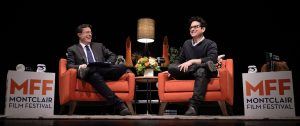
Stephen Colbert interviews J.J. Abrams at a fundraiser for the Montclair Film Festival
A sold-out crowd gathered in NJPAC’s Prudential Hall as Colbert interviewed J.J. Abrams, celebrated screenwriter and director, notably of “Star Wars: The Force Awakens,” the much-anticipated film that exploded into theaters a few weeks ago.
Tom Hall, executive director of the Montclair Film Festival, says he couldn’t believe Abrams agreed to appear less than a month before the film’s release. He attributes that entirely to Colbert.
“In the summer, Evie was like, ‘Well, the next thing’s the fundraiser. Who do we want Stephen to invite?’” Hall says. “She said, ‘I think he wants to invite J.J. Abrams,’ and I said, ‘Well that’s nuts, but who am I to tell Stephen Colbert no?’ And I think he texted him, and J.J. texted back and was like, ‘Sure.’ Our reputation is not going to pull J.J. Abrams away from editing Star Wars – that’s his friendship with Stephen.”
If Abrams seemed surprised at the 2,800 screaming fans ready to hang on his every word, for Colbert it was business at usual.
“This is Jersey,” he told Abrams. “They show up!”
If there is one word to describe Colbert, it’s “effortless.” He jumps from one topic to the next with the grace of a seasoned interviewer, the whole time managing to be hilarious.
It’s an ease he’s earned through decades of improv and, like all comedians, the occasional flop.
“We have this rule,” he says of his show on CBS. “My [executive producer] says, ‘I don’t ever want to hire a comedy writer who hasn’t tried to go get a laugh from his material.’ Because you need to know what it’s like to eat it on stage, so you know what you’ll be doing to someone if you don’t give them your best writing.”
Colbert knows a thing or two about eating it. In 2006, when The Colbert Report was only a few months old, he appeared at the White House Correspondents’ Dinner.
Traditionally, a comedian is invited to speak at the event, “roasting” both the president and the assembled members of the press. It was awkward – and not because Colbert wasn’t funny. He was doing something no speaker before him had ever done, and most of the audience had yet to understand: he was playing a character.
The Stephen Colbert of The Colbert Report, and the one who spoke at the Correspondent’s Dinner, was an acerbic, far-right-wing conservative blowhard – a caricature of Fox News figures like Bill O’Reilly and Sean Hannity. He never broke character, and the people in the room seemed like they didn’t quite get what he was doing. Nonetheless, video of the speech went viral, catapulting the character of “Stephen Colbert” to instant stardom. He maintained the on-camera persona until the final episode of The Colbert Report in December 2014.
Guests on the show were subjected to absurd lines of questioning that made for great television. Colbert fondly recalls an interview with late actor Leonard Nimoy, best known for his portrayal of Mr. Spock on “Star Trek.” Nimoy was also a prolific writer and photographer.
“I really loved Leonard Nimoy, and I had him on the old show,” Colbert says. “He had a book of nudes he’d done of people who were very overweight. They were beautiful photographs. And of course I did it in character, and my character is ignorant of many things that I know. So I went backstage and said, ‘Leonard, it’s really nice to see you, I’m a big fan; would you be OK if I have no idea who the hell you are?’ And he said, ‘I would love it.’ So I just lit into him for like eight minutes going, ‘What’s with the nudie pictures here, Len?’ And he loved it, he couldn’t have been happier about it.”
When it was announced that Colbert would be taking over as host of “The Late Show,” there was a great deal of speculation about what he would be like without the character. Hall, as someone who also knows Colbert away from the TV cameras, says what he sees on CBS is still something of an act.
“In my opinion, The Colbert Report was one very long performance,” Hall says. “The new character I think is a mix of that and the real person. He’s juggling the new format and trying to figure out who he is in the middle of it, I think that’s pretty clear.”
What is undeniable is Colbert’s talent for conversation. It isn’t just that he does his research – he came prepared for the Abrams interview with a binder’s worth of notes – but that he is able to draw from an impossible wealth of knowledge on every imaginable subject.
“He has such incredible knowledge of everything,” Hall says. “Literature, politics and art – to have that well to draw from in any situation as an interviewer is amazing. And he’s a master of improv, which is all listening and following along and responding. The J.J. Abrams conversation was so interesting because Stephen was right there with him the whole time, and they were super fun together. And you can see why they get along. It was like watching two people who are in the same mental space just have a conversation with each other.”
Colbert’s friendship with Abrams might have something to do with the fact that he’s a self-professed nerd. While Abrams talked about making his first film as an adolescent, Colbert spent those years invested in a fantasy role-playing game.
“We played Dungeons & Dragons,” he says. “In the morning, at night. If I’d put a fraction of the effort I put into Dungeons & Dragons into my schoolwork, I would’ve graduated without so much crisis. That was my level of nerd-dom.”
That “nerd-dom” extends to Star Wars, and the conversation brought up meaningful childhood memories for Colbert.
“I was 13, and I won tickets from a local radio station,” he remembers. “Charleston, S.C. for some reason was an advance-screening town, and I saw [‘A New Hope,’ the first film] three weeks before the rest of the country saw it. From the moment I saw, ‘A long time ago in a galaxy far, far away…’ I was completely sold. And then for the next three weeks I couldn’t explain to my friends that everything was different now. I had to say, ‘You’ll get there eventually.’ I’ve spent my entire life three weeks more invested in Star Wars than everyone I know.”
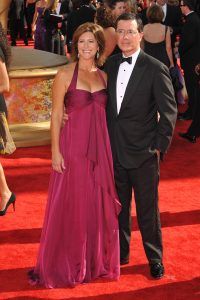
The funnyman with his wife Evie
Colbert has built an entire career by making it up as he goes along, and it’s still working. That’s also his advice to young people trying to make a name for themselves in a challenging business. It’s easy to succeed, he says, if you’re not afraid to take some risks.
“When people ask me, ‘How do you get to do what you did? What do I do?’ I always say, ‘Get in trouble,’” Colbert says. “I had a friend in Chicago who’s now a director. We went to school together, and at 23 we were both gainfully unemployed. He would call me up and say, ‘Do you want to get in trouble?’ and I’d say yes. What that meant was he had found a space, and he had called the press and sometimes told them the title of the play we hadn’t written. And then we had to do it. They’d show up, and we would do a play we’d written in nine days. I learned so much, and it’s all because we got in trouble, and we did it over and over again.”
“So go get in trouble. Write something, get a space, do a reading – and believe me – if you know that someone whose opinion you care about is going to come, you’ll put a candle under your ass to make it good. Maybe it won’t go well, but so what? Do it again.”

